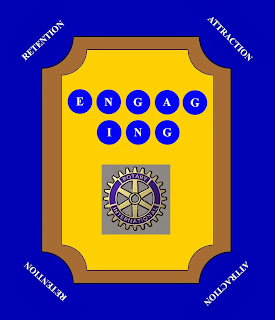(In this Rotatorial, members means club members and foundation donors.)
Engaged Rotary advocates attract and propose an average of
5.4 more new members than the average club member, and recommend infinitely
more than do members who walk out because of having unmet expectations and/or
having been misled.
Effective Rotary clubs know that retaining members starts
with the initial contact, continues until the relationship ends, and is
directly related to:
- The way the organization engages and communicates with its members, and
- The reputation the organization creates with its target audience.
The Rotary network has almost twenty years experience,
epitomized by the 2001 - 2002 membership push, that proves, when the goal is to
sustain membership growth, recruiting does not work. ENGAGING does work! Is ENGAGING members and creating advocates the center of:








